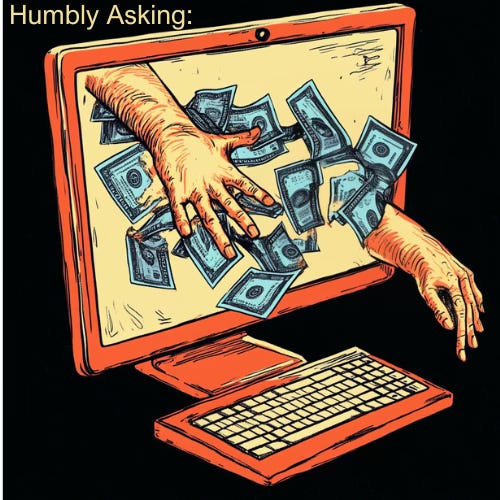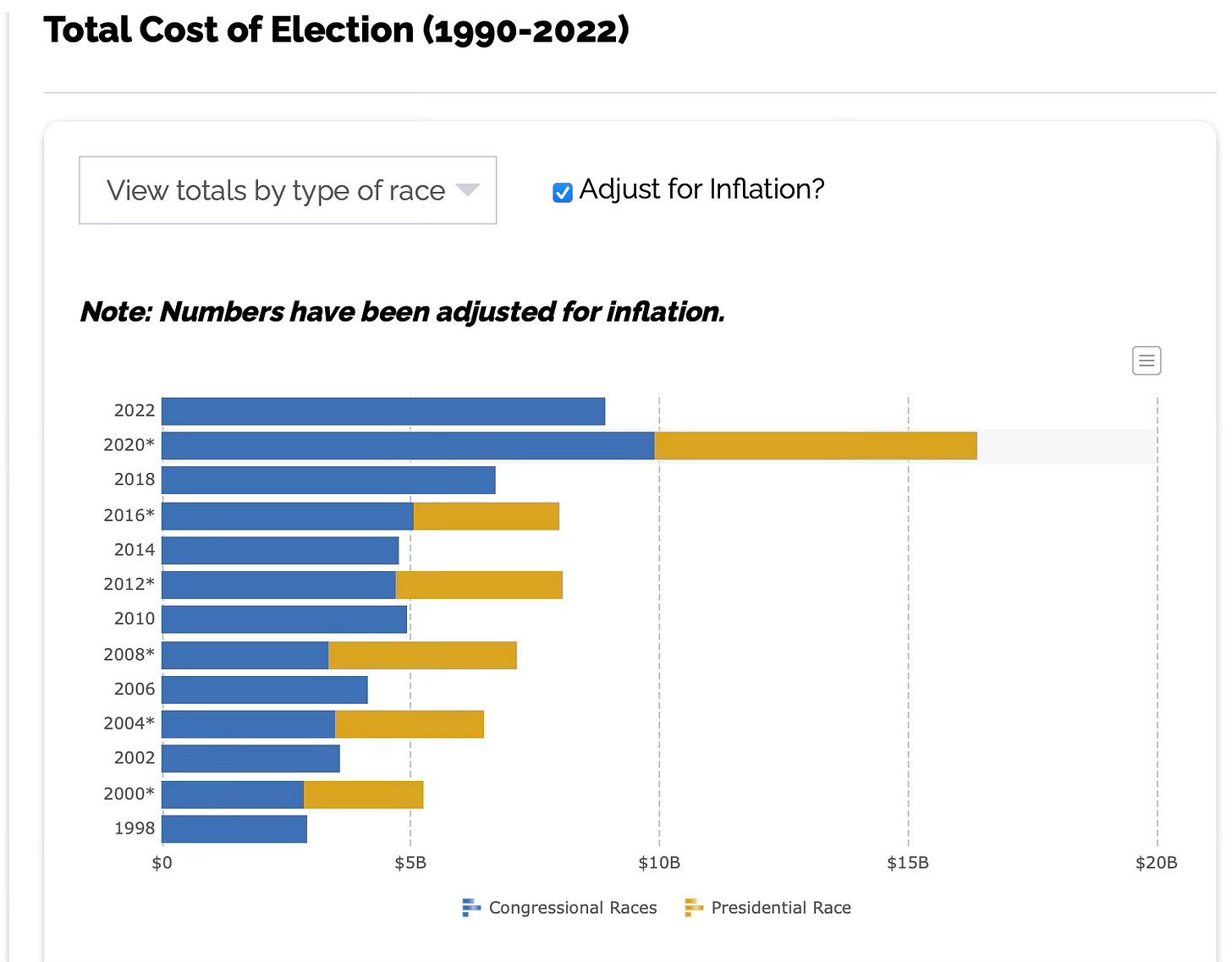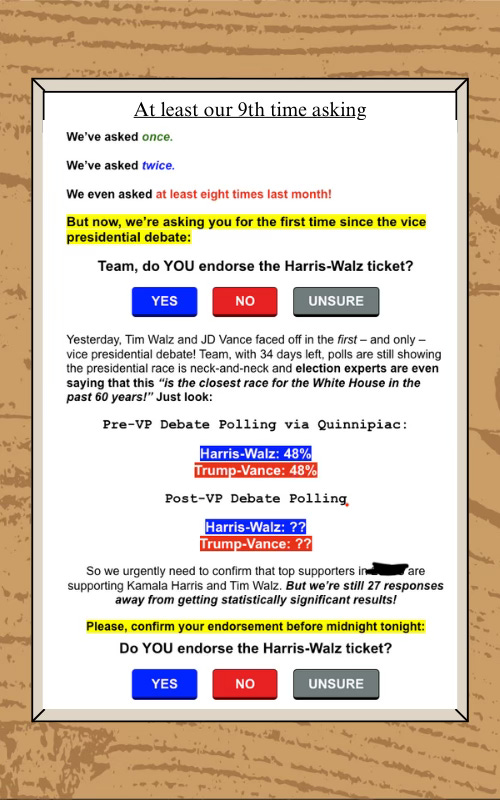The presidential campaigns don’t need your $5
And the more they devote themselves to fundraising and advertising, the more broke our democracy gets.
Can you chip in $5? $3? I'm begging you. Final deadline. Last Chance. $1? It stinks, BIG time. You deserve an explanation.
Yes, these are all political fundraising email subject lines. And yes, it’s out of control. And yes, it needs to stop.
This barrage of emotionally manipulative emails (not to mention the creepy-stalker texts, and the desperate social media) is doing active damage to our democracy.
It’s making self-governance feel like a marketing scam.
It’s amplifying negativity, fear, and anger — not emotions you want to double down on if you care about democratic health.
And it’s turned our political parties into marketing consultant collectives, eroding their core role in democratic representation.
Which is why I need you to keep reading. I’m begging.
What I’m about to tell you is something the political establishment doesn’t want you to know…
The bigger pretzel billboard won’t buy electoral success (and other things “they” don’t want you to know)
Here’s the first thing the political establishment doesn’t want you to know: Presidential campaigns do not need your $5.
In 2020, a combined $16.4 billion was spent on federal elections, $6.5 billion on the presidential election, and $9.9 billion on congressional elections (including primaries). My guess: 2024 will approach $20 billion. (For some context, consider that the GDP of Nicaragua (population 6.9 million) is $18.8 billion.)
This graphic from Open Secrets shows total spending on elections going back to 1998. It keeps growing. Even as the number of competitive swing states continues to shrink. And the share of potentially competitive congressional elections has dropped to around 10 percent.
The Harris-Walz campaign is flush enough to hoist billboards like this one in Philadelphia. (Harris has a bigger pretzel? What are we, six years old?)
Here’s the second thing the political establishment doesn’t want you to know: most of the money is used for advertising. Of course, few fundraising emails mention “advertising.” They are far more likely to use phrases like “grassroots support” for example. Sounds better, doesn’t it? The following graphic comes from the Wall Street Journal:
So, does that advertising make a difference? Here’s the third thing the political establishment doesn’t want you to know — once you get past a certain threshold, more money has no correlation with outcomes. As one recent meta-analysis concluded, the average effect of campaign contact and advertising on election outcomes is zero.
Of course, if the average effect is zero, there’s still variation. (Think of the statistician who drowned in a river with an average depth of three feet.)” There are certainly cases where money can have an impact. I generally matters most where there is the least of it. Money matters early in political careers, in helping certain candidates get momentum and visibility. It matters early in the election, especially when campaigns invest early in reaching undecided. Money also matters more the further down ballot one goes. The more local, the greater the impact.
This election season, some friends asked me: should I donate to the Harris-Walz campaign? My answer: NO. If you want to contribute to political campaigns, look down the ballot. The further down, the more their money matters. And lots of important policies get decided at the state and local level! If you want to strategically give down ballot, I recommend the Vote Maximizer website.
But most people ignore the state and local races — which is precisely why a little money for a state legislative race could have such a big impact! Few people really know or care about these down-ballot races. And very few down ballot races are even competitive (and many more even lack challengers). I can see why residents of these one-party enclaves send their dollars to the few close races that decide control of the country. Locally, their engagement feels meaningless. But they want to make a difference. And those national campaigns have the money to keep asking for more money!
And if you do care about control of the Senate, Vote Maximizer concludes that Nebraska is your best investment. (There’s a fascinating race there, with Independent Dan Osborn within striking distance of the Republican incumbent, Deb Fischer)
The Harris-Walz campaign does not need your $5. So why are they begging for it?
If the campaigns don’t actually need your money, why do they keep asking for it?
One explanation: It’s an arms race. No campaign ever wants to fall behind. After all, no campaign manager ever got blamed for raising too much money.
So, the logical strategy for any campaign is to keep raising money and keep spending it. Just imagine how many more pretzel billboards you could, ummm, raise.
Alternatively, maybe campaign consultants are engaged in multi-billion dollar grift. They know all this extra spending is pointless. But the more money they raise, the more money they make. And election season is money-making time.
Alternatively, maybe they don’t know what else to do.
It’s likely a combination of all three.
Both the Democratic and the Republican Party are essentially networks of campaign consultants. The formal party apparatus is sparse, even hollow. Consultants do the work and make the money. By political scientist Adam Sheingate’s calculation, 60% of the campaign spending in the 2012 election went to consultants ($3.6 billion out of $6 billion).
Sheingate’s excellent book, Building a Business of Politics: The Rise of Political Consulting and the Transformation of American Democracy, documents how political consultants took over the business of campaigning. In so doing, they standardized political campaigns around a limited number of tools: broadcast ads, polling, messaging, and fundraising.
It is a business, and, as Sheingate writes, “the more polls, pieces of mail, or television advertisements a consultant provided, the more money he or she made from the campaign.” Broadcast ads, which still dominate campaigns, are particularly lucrative—an 18 percent markup to create the ads and a 15 percent commission to place them.
In short, if you want to run a campaign at almost any level, you hire a campaign consultant or consultants. That is how campaigns are run today. Different campaign consultants may have different styles and approaches, but they are all selling the same basic approach: Flood the media with advertisements. This is just how you run a campaign. This is the business. Candidates are products, sold like car insurance.
Want to try a different approach? Good luck with that.
In the modern digital era, the campaign consulting industry has developed increasingly sophisticated tools to micro-target, with both ads and fundraising. It’s all part of the business: raise money, run ads, and raise even more. That’s how campaigns operate—there’s no alternative.
So as long as you can keep raising money, why wouldn’t you? What campaign consultant would claim, “hey, we’re satisfied with what we have, no need for more” when there are still people who haven’t contributed or reached their giving limit? After all, you never know …
Why not? Well, consider the consequences. What is all this doing to our democracy?
The fundraising is toxic, the emails are manipulative, and democracy is at stake.
We’ve all mocked the hyperventilated rhetoric of the endless fundraising emails. But the frenzied pleading keeps coming.
Political scientists have studied the text of online and email fundraising. Research confirms it: the language really is distinctly polarizing, toxic, and negative. Campaigns use incivility to intentionally anger potential donors. Anger is a motivating emotion. And with sophisticated technology, the messaging can be micro-targeted and A/B tested for maximal yield.
As one recent academic article (“Donate to help us fight back: Political fundraising and toxic rhetoric online”) explains:
“a flood of negative, toxic, and polarizing tactics in donor-targeting ads may further polarize the electorate… We know that campaigns strategically use strong emotions such as anger and can mobilize, sustain partisan solidarity, and trigger information-seeking behavior …. Anger has a potent effect on individuals’ behavior; it rallies them to defend their convictions, foster cooperation with co-partisans, com- promise less, seek out bias-confirming information, and participate more in political processes… Furthermore, anger diminishes the importance individuals place upon democratic values and can drive support for extreme politics”
Another recent article, “Manipulative tactics are the norm in political emails: Evidence from the 2020 election cycle,” makes clear what any casual observer knows. “We find that …manipulative tactics—techniques using some level of deception or clickbait—are the norm, not the exception.”
In short, campaigns are whipping up anger and cashing in on outrage, all to boost short-term fundraising, and political emails thrive on dishonesty and lures, using time-tested tricks to exploit curiosity gaps and manufacture fake urgency.
For example, my wife recently received a Harris-Walz campaign email with the subject line, “At least our 9th time asking” (unlike my wife, I somehow have managed to unsubscribe — for now, at least)
A few typical things to note here: First, there is the fake deadline (before midnight). There is also the fake specificity (27 more responses needed). The zip code is redacted, but the social pressure to be a “top supporter” in my community is classic social pressure.
And… “At least our 9th time asking” ??? Sorry? Are you my mother?
The more these emails keep coming in, the harder time I have taking the campaign seriously. If they really need $5, or $3 that badly… maybe they have bigger problems? Or, wait, hold on… Have they considered this amazing crypto investment opportunity I just got an email about?
And yes, I am aware of the significance of this election. I study democracy for a living. But when my inbox and text messages fill up with messages so schlocky a Macedonian teenage hacker might have written it with a spam-generating bot to steal my credit card information, even I start to wonder.
And yes, This problem is worse on the Republican side. The studies I’ve cited pick up a clear asymmetry. Republicans engage in more deceptive practices, more toxic rhetoric. Of course, it doesn’t take a political science PhD to see how transparently grift-y it all is. Just consider: $59.99 for Trump’s “God Bless the USA” Bible. God helps those who help themselves, I guess… to other people’s money.
Consider some of the latest from the Trump campaign:
- “I can’t afford to send this email to everyone” (not true, of course. Sending email is very cheap, which is why the campaign does it).
- “Coffee?” (Selling a “FEAR NOT” coffee mug)
- “I want to interview you” (message: "I need to interview 47 of my CLOSEST FRIENDS AND ALLIES, and it would mean the world to me if YOU RESPONDED!)
- “Confidential Memo. Don’t let anyone else view your screen!” ( message “I promise that your responses will be kept completely confidential from the WOKE MOB, so this is your chance to be completely honest with me. QUESTION #1: ARE YOU AN AMERICAN CITIZEN OR AN ILLEGAL IMMIGRANT? )
- “Congrats, you’re invited to Mar-a-Lago!” (It’s actually an invitation to enter a contest for a free trip)
The Trump campaign also scammed more than half a million donors into weekly recurring contributions through fine print. Many of these donors were retirees, who could ill-afford the contributions.
The more the campaigns spend, the darker our politics becomes
And what if I did contribute to a presidential campaign? What does that money buy again?
Lots and lots of negative advertising. Which builds up like a thick, toxic smog of doom — choking off our trust in institutions, and poisoning our tolerance for legitimate opposition.
Here’s what the political science says: More negative campaigning makes polarization worse, and increases anti-system populist attitudes. More negative campaigning decreases trust in government. More negative campaigning fosters apathy and a “gloomier public mood.”
Thus, one study concludes after summarizing the literature on negative campaigning, “the conclusion to be drawn from the literature is clear: Negative campaigning has the potential to do damage to the political system itself, as it tends to reduce feelings of political efficacy, trust in government, and perhaps even satisfaction with government itself..”
Bad is stronger (and more memorable) than good (see my recent post on negativity bias), so the negative ads linger, like toxic particles in the air
And the absolute numbers are very high.
To be sure, negative advertising and campaigning has its place. It can hold those in power accountable, and alert citizens to genuine shortcomings of candidates. But we’re way past that.
Could we do campaigning differently?
But imagine for a second: what if this mega-marathon of manipulative election fundraising and advertising didn’t consume all of politics?
Let me present a different vision: year-round party organizing and community engagement.
Imagine if instead of the hamster-wheel fundraising, parties spent their money on building up year-round presences in communities around the country. Picture a Democratic Club or a Republican Club, where party organizers host community events — days of community service, political discussion groups, public lectures, workshops for students to learn about politics and government, and help for local residents who want to learn more about government programs. I can imagine a small staff, and even something like local membership dues.
I can imagine people seeing the parties as genuine intermediary organizations, where friends and neighbors sometimes go to get involved. Then, when election season comes around, a group of dedicated volunteers might go around the community, telling people about the stakes of the election.
Is this crazy? It’s not unlike how politics used to operate, though in the past, such Democratic and Republican Clubs were a bit more exclusive and patronage-oriented for today’s tastes. Still, I don’t think the idea of parties investing in year-round organizing presence is crazy at all. It would create a much healthier democracy by sustaining much healthier political parties.
But oh wait… what would happen to all those campaign consultants and digital marketers who run the parties? Besides, much of the country is so dominated by one party that investing beyond swing states and districts seems pointless, right?
Consider: Two decades ago, Howard Dean proposed a “50-state strategy” for the Democratic Party, arguing Democrats should invest everywhere. Paul Begala, a Democratic political consultant and commentator, dismissed the strategy as "hiring a bunch of staff people to wander around Utah and Mississippi and pick their nose.” Presumably, he spoke for many in the Democratic consultant class. The strategy ultimately failed for lack of party support.
I don’t see this changing unless we fundamentally change how we finance parties and campaigns. As long as parties and campaigns depend on privately-raised money, they will be in a destructive arms race. It would be foolish for either side to stop. There is too much at stake.
The obvious solution (to me) would be publicly-financed political parties and campaigns. This is the norm across most advanced democracies. Parties and campaigns get public dollars. This equalizes the resources. It also allows parties and candidates to focus more on the campaigning, instead of the fundraising.
The longstanding argument for public financing was to make politics less corrupt, because it reduced candidates’ dependence on wealthy private donors. This is still a good argument. But I think the better argument is just how destructive all this relentless campaign fundraising is to the health of democracy. I used to think that maybe small donor matching funds would help, but now I just worry that small donor matching would make this relentless online and email fundraising even worse.
So, it really has to be fully public funding for parties and campaigns. (see, for example this Brennan Center Report: “Stronger Parties, Stronger Democracy,” on the case for public financing of parties)/ Full public funding for parties could ensure that resources are spent on year-round organizing in communities nationwide.
Of course, we still confront the problem of so few regions having genuine two-party competition, which discourages parties from investing everywhere. Maybe more investments would increase competition.
But this is why I also see electoral reforms like fusion voting and proportional representation as so important — they encourage more party competition by creating space for more parties. And competition is good! Parties need a reason to invest and organize in as many places as possible.
My broader theme throughout my writings is that 1) the health of our democracy depends on the health of our political parties, and 2) We need more and better parties. And yes, Republicans are in worse shape, but as I wrote recently in The New Republic, “The Democratic Party Is (Still) Broken”
But party-building is hard. It’s so much easier to just fundraise for ads. And as long as those ads keep raising money, campaigns will keep sending them.
And yes, this election really is important, which is what makes the bigger problem of fundraising and negative advertising such a tricky pretzel to escape.
But when you give to a big national campaign, it’s really a waste. So give down ballot if you can. Or, if there’s no race you care about, maybe it’s better to just give to a local charity, where the money will actually help real people with real problems.
Or, better yet, why not support organizations working to redirect our politics towards a vision of more and better parties, towards a healthier democracy? I can recommend a few: There’s the Political Reform Program at New America, where I work; There’s Fix Our House, a campaign for proportional representation in the United States, which I co-founded; There’s the Center for Ballot Freedom, which works to re-legalize fusion voting, which I also co-founded.
Even $5 makes a difference. I’m begging you. Our democracy hangs in the balance.










This is superb, Lee. I’m so glad you laid this out the way you did in terms of an arms race and also what an alternative might look like. I know people are very cynical about the latter. Things are so bad it’s hard for people to imagine how we can make them better. But if we’re gonna get out of this mess, we have to start somewhere, and you’ve offered some practical, promising ideas.
I feel so stupid. And I should have known better.
I feel so used.
$25 gone with the wind.